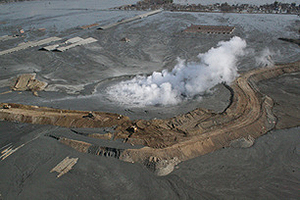29.8.16 | From 4 to 7 September, the Leibniz Centre for Tropical Marine Research (ZMT) is hosting an international scientific congress on the impacts of climate and environmental changes in coastal zones in Bremen. Since 1971, the renowned "ECSA" conference is held once a year at changing locations. On initiative of the ZMT, the conference will be taking place in Bremen for the first time this year. More than 500 experts from all over the world will attend the four-day symposium which will be held at the Congress Centre of Maritim Hotel Bremen. The Bremen Senator for Science, Prof. Dr. Eva Quante-Brandt, will be giving the welcoming address at the opening on 4 September at 3.00 p.m.
Humans are drivers of and strongly affected by global change at the same time. Climate and regional environmental changes often have dramatic impacts on resources and ecosystem services which in turn strongly affect the livelihood of humans, animals and plants in coastal regions.
Scientists are faced with the following questions: Which impacts are anthropogenic, which ones are natural and how large is each share? Inter- and transdisciplinary approaches are more important than ever before to understand the complex consequences for man and environment and thus to create a basis for a sustainable use.
ECSA 56 brings together a global multi-disciplinary community of researchers to discuss and address the latest scientific findings and management of territorial waters and estuaries in a rapidly changing world. The conference program offers a wide range of topics: More than 320 talks and 220 posters will deal with questions which are raised in the disciplines of biogeochemistry, economy, hydro- and sediment-dynamics and socioeconomics.
"I am pleased that we were able to bring this international conference of experts to Bremen," says Dr. Tim Jennerjahn, organizer of the ECSA56 and leader of the ZMT Work Group "Ecological Biogeochemistry". "Here in Bremen we would like to discuss the latest developments in international coastal research and look for possible solutions for existing problems associated with the challenges of global change."
Particular emphasis will be placed on changes in coastal dynamics by sea-level rise or engineering structures like embankments, biogeochemical fluxes at the transition from land to sea, changes in ecosystem structures and functions. Another focus point will be the role man plays as a trigger of and individual affected by environmental change.
In addition to lectures which will be held by top-class speakers from 48 countries in the English language, young scientists will be offered the opportunity to attend interesting workshops. Thus, the numerous doctoral candidates and post-docs present can obtain helpful tips from experienced scientists and chief editors about new working methods, publications and expert opinions in international journals.
The ECSA56 "Coastal Systems in transition: from a natural to an anthropogenically-modified state", will be organized by the Leibniz Centre for Tropical Marine Research (ZMT) and the international scientific association Estuarine & Coastal Sciences Association (ECSA) in cooperation with the Elsevier Journal.
When: 4 – 7 September 2016
Where: Maritim Hotel & Congress Zentrum Bremen
Please download the program here: www.estuarinecoastalconference.com

 Contacts
Contacts
PD Dr. Tim Jennerjahn
+49 (0)421 23800 - 44This email address is being protected from spambots. You need JavaScript enabled to view it.




